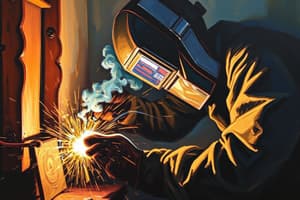Podcast
Questions and Answers
What does GTAW stand for?
What does GTAW stand for?
- Gas Tungsten Arc Work
- Gas Tungsten Arc Weld
- Gas Tungsten Arc Welding (correct)
- Gas Tungsten Arc Warping
What is another name for GTAW?
What is another name for GTAW?
- Heliarc (correct)
- MIG
- OXY
- TIG (correct)
What are the advantages of GTAW?
What are the advantages of GTAW?
Produces a more precise weld, can be used at lower amperages for thinner metal, and can work on exotic metals.
What components make up the GTAW process?
What components make up the GTAW process?
Why is the tungsten electrode considered a non-consumable electrode?
Why is the tungsten electrode considered a non-consumable electrode?
When the power source is set to AC, where is the heat distributed?
When the power source is set to AC, where is the heat distributed?
What type of shielding gas is superior for welding metals?
What type of shielding gas is superior for welding metals?
What is the chemical symbol for tungsten?
What is the chemical symbol for tungsten?
What does AWS stand for?
What does AWS stand for?
What is postflow time?
What is postflow time?
What should the tip of the tungsten electrode look like?
What should the tip of the tungsten electrode look like?
What is the recommended gas flow range for GTAW?
What is the recommended gas flow range for GTAW?
What is preflow?
What is preflow?
What is Pulsed current?
What is Pulsed current?
What are the amperage ranges for 1/16" E.W.P.?
What are the amperage ranges for 1/16" E.W.P.?
Flashcards are hidden until you start studying
Study Notes
Gas Tungsten Arc Welding (GTAW)
- GTAW stands for Gas Tungsten Arc Welding, also known as TIG (Tungsten Inert Gas) and Heliarc.
- Advantages include precise welds, suitability for thinner metals, and the ability to weld exotic metals with low distortion and no slag or spatter.
Components and Operation
- Key components: power source, torch, ground clamp, and externally supplied shielding gas.
- The tungsten electrode is non-consumable, meaning it does not deplete during welding.
- Depending on the power source settings:
- AC: Equal heat distribution, 50% on tungsten, 50% on the workpiece.
- DCEN: 30% heat on tungsten, 70% on the workpiece.
- DCEP: 70% heat on tungsten, 30% on the workpiece.
Shielding Gas
- Argon is primarily used for welding metals, providing a higher arc voltage and ease of arc initiation.
- Helium may be added to increase heat input for faster welding of mild steel and titanium.
- Argon is an inert gas, not reacting with other elements, and is heavier than air (1.4 times).
Gas Flow and Amperage
- Typical gas flow rate is 15 to 20 CFH; settings may increase for higher currents or larger nozzle sizes.
- Amperage ranges vary by tungsten electrode size:
- 1/16" E.W.P.: 50-100 amps
- 3/32" E.W.P.: 100-160 amps
- 1/8" E.W.P.: 160-210 amps
Tungsten Electrodes
- Tungsten has the highest melting point of metallic elements (~6200°F) and exhibits high melting point, low electrical resistance, and good heat conductivity.
- AWS classifications for tungsten electrodes include:
- EWP (pure tungsten)
- EWTh-2 (2% thoriated)
- EWCe-2 (2% ceriated)
- EWZr-1 (zirconiated)
- EWLa-1.5 (1.5% lanthanum)
Electrode Preparation and Torch Technique
- The tungsten tip should be rounded (balled) for optimal performance.
- Optimal torch angle is 0 to 15 degrees; maintaining a perpendicular angle enhances shielding gas coverage.
- Too much torch angle can distort gas coverage and lead to contamination.
Welding Techniques
- Postflow time is crucial for cooling and preventing oxide formation at the weld site.
- Recommended that shielding gas flows 10-15 seconds post arc stoppage.
- Preflow gas flow protects the arc zone from atmospheric contamination during the initial phase of welding.
Welding Materials
- Carbon steel properties are determined largely by carbon content, which ranges from 0.04% to 1.4%.
- Aluminum is known for its corrosion resistance and good thermal/electrical conductivity.
- Different alloys can significantly change metal properties, impacting welding techniques and filler rod selection.
Filler Rods and Gas Nozzle
- Filler rods must match the material and alloy being welded, with sizes dictated by workpiece thickness.
- AWS classifications provide specific filler rod examples for aluminum (e.g., ER4043, ER5356), stainless steel (ER308L), and carbon steel (ER70S-6).
- Gas nozzle size should have an inner diameter at least three times that of the electrode for effective shielding.
Current Modes and Their Effects
- Pulsed current allows for controlled welding with lower heat input, reducing distortion in thin materials.
- High-frequency current is utilized to maintain the arc during welding, even when the electrode is slightly separated from the workpiece.
Studying That Suits You
Use AI to generate personalized quizzes and flashcards to suit your learning preferences.




